|
Featured picture tools: |
These featured pictures, as scheduled below, appeared as the picture of the day (POTD) on the English Wikipedia's Main Page in March 2008. Individual sections for each day on this page can be linked to with the day number as the anchor name (e.g. [[Wikipedia:Picture of the day/March 2008#1]] for March 1).
You can add an automatically updating POTD template to your user page using {{Pic of the day}} (version with blurb) or {{POTD}} (version without blurb). For instructions on how to make custom POTD layouts, see Wikipedia:Picture of the day.Purge server cache
March 1

|
A surfer off the coast of Santa Cruz, California, is performing a "cutback", or very sharp turn. Santa Cruz and the surrounding Northern California coastline is a popular surfing destination; however, the year-round low temperature of the Pacific Ocean in that region (averaging 57 °F or 14 °C) necessitates the use of wetsuits. Photo credit: Mila Zinkova
Recently featured:
|
March 2

|
A diagram of a simple prokaryote. Prokaryotes are organisms that lack a cell nucleus (= karyon), or any other membrane-bound organelles. They differ from the eukaryotes, which have a cell nucleus. Most are unicellular, but some prokaryotes are multicellular organisms. Image credit: Mariana Ruiz
Recently featured:
|
March 3

|
Cappadocia, a region in central Turkey, is known for its Göreme National Park, a UNESCO World Heritage Site. The area is famous for its "fairy chimney" rock formations, some of which reach 40 metres (131 ft) in height. From the 4th to 13th century CE, occupants of the area dug tunnels into the exposed rock face to build residences, stores, and churches. Photo credit: Mila Zinkova
Recently featured:
|
March 4

|
These two Glaucus atlanticus, a species of nudibranch, were washed up on Surfers Paradise Beach in Queensland, Australia. The larger one is about 35 mm (1.4 in) in length. G. atlanticus preys on the Portuguese Man o' War and other surface-dwelling sea animals. Occasionally Glaucus will feed on others of its kind. Photo credit: Taro Taylor
Recently featured:
|
March 5

|
A flower bud of a Nodding Pincushion (Leucospermum 'Veldfire'), a Leucospermum cultivar, found in San Francisco Botanical Garden. This genus consists of about 50 species. The flowers are produced in dense inflorescences, which have large numbers of prominent styles, which inspires the name. Photo credit: Mila Zinkova
Recently featured:
|
March 6

|
The Arc de Triomphe at night. Commissioned by Napoleon after the victory in the Battle of Austerlitz, it stands in the middle of the Place Charles de Gaulle, at the western end of the Champs-Élysées. At 51 metres (167 ft) high and 45 m (148 ft) wide, it is the second-largest triumphal arch in the world. The monument honors soldiers throughout French history, and houses the tomb of the unknown soldier. Photo credit: Benh Lieu Song
Recently featured:
|
March 7
|
Annie Oakley, a 19th century sharpshooter and exhibition shooter who performed as part of Buffalo Bill's Wild West Show, demonstrates her rifle target skills in this 1894 film. Using a .22 caliber rifle at 90 feet (27 m), Oakley reputedly could split a playing card edge-on and put five or six more holes in it before it touched the ground. Film credit: Edison Manufacturing Co.
Recently featured:
|
March 8

|
The Peablue (Lampides boeticus) is a small butterfly found in Europe, Africa and Asia that belongs to the Lycaenidae family. The eyespot and pseudo-antennae on the hindwing are a form of automimicry. Photo credit: Laitche
Recently featured:
|
March 9
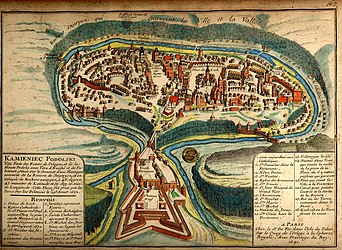
|
A 1691 French map of Kamianets-Podilskyi, Ukraine, depicting the city's old town neighborhood and castle, surrounded by the winding Smotrych River. It was originally part of Kievan Rus' and annexed into the First Polish Republic, but at the time of the map's creation, the city was part of the Ottoman Empire. It shortly returned to Poland and later became part of the Russian Empire with the Second Partition of Poland in 1793. Map credit: Nicolas de Fer
Recently featured:
|
March 10

|
Visualization of a diffusion tensor imaging (DTI) measurement of a human brain. Depicted are reconstructed axon tracts that run through the mid-sagittal plane. Especially prominent are the U-shaped fibers that connect the two hemispheres through the corpus callosum (the fibers come out of the image plane and consequently bend towards the top) and the fiber tracts that descend toward the spine (blue, within the image plane). Image credit: Thomas Schultz
Recently featured:
|
March 11
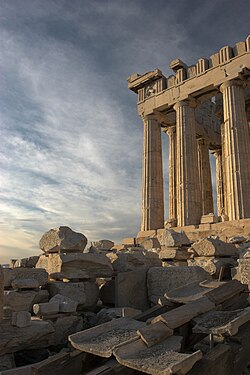
|
Built on the Acropolis of Athens in the 5th century BCE as a temple to Athena, the Parthenon today stands in ruins. Much of the original marble that formed the roof now lies in a pile of rubble at its base, and half of the frieze is now displayed in the British Museum. Even so, it remains one of the most important surviving buildings of Classical Greece and a symbol of Athenian democracy Photo credit: Thermos
Recently featured:
|
March 12

|
Tufa towers in Mono Lake, California. Tufa are spires and knobs made of calcium carbonate formed by interaction of freshwater springs and alkaline lake water. Tufa can reach heights of 30 ft (9.1 m). Photo credit: Mila Zinkova
Recently featured:
|
March 13

|
|
Mira A is a red giant variable star in the constellation Cetus. This ultraviolet-wavelength image mosaic shows a comet-like "tail" stretching 13 light-years across space, which consists of hydrogen gas blown off of the star, with the material at the furthest end of the "tail" having been emitted about 30,000 years ago. Mira itself is seen as a small white dot inside a blue bulb. Photo credit: Galaxy Evolution Explorer
Recently featured:
|
March 14

|
A portrait of Edward VI of England, when he was Prince of Wales. He is shown wearing a badge with the Prince of Wales's feathers. It was most likely painted in 1546 when he was eight years old, during the time when he was resident at Hunsdon House. Edward became King of England, King of France and Edward I of Ireland the following year. He was the third monarch of the Tudor dynasty and England's first ruler who was Protestant at the time of his ascension to the throne. Edward's entire rule was mediated through a council of regency. He died at the age of 15 in 1553. Artist: Unknown, probably of the Flemish School
Recently featured:
|
March 15

|
A true-color picture of Ireland, as seen from space, with the Atlantic Ocean to the west and the Irish Sea to the east. Image credit: MODIS
Recently featured:
|
March 16

|
An unmarked Hereford calf. Hereford cattle (Bos taurus) are a widely used breed in temperate areas, mainly for beef production. Originally from Herefordshire, England, they are found in the temperate parts of Australia, the Southwestern US, Western Canada, Argentina, Uruguay and New Zealand. Photo credit: John O'Neill
Recently featured:
|
March 17

|
Pāhoehoe lava overflows from this open lava channel on the island of Hawaiʻi as a result of a fissure vent eruption. The channel is crusting over with a V-shaped opening pointing upstream. The crusting-over process usually starts at the upstream end. The crust grows downstream for a considerable distance, then the crust founders and sinks, opening the channel to crusting over again. Photo credit: Mila Zinkova
Recently featured:
|
March 18

|
The Magpie-goose is a type of waterbird found in the countries of Australia and New Guinea. In the state of Victoria, Australia, the bird was listed 'near threatened' in 2007, but is not considered threatened in the rest of the country. It is a unique member of the order Anseriformes, and arranged in a separate family and genus. Photo credit: Paul Thomsen
Recently featured:
|
March 19

|
The aircraft carrier USS Franklin is afire and listing by 13° after being hit by a Japanese air attack on March 19, 1945, during World War II. The crew is clearly seen on the flaming deck, watched by the crew of the light cruiser USS Santa Fe (from where this was taken), which was alongside assisting with firefighting and rescue work. The casualties totaled 724 killed and 265 wounded. Photo credit: PHC Albert Bullock, United States Navy
Recently featured:
|
March 20
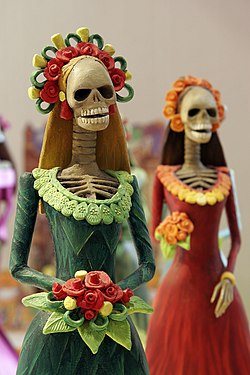
|
Two Catrina figurines, approximately 38 cm (15 in) tall in the City Museum of León, Guanajuato, Mexico. Popularized by José Guadalupe Posada, the Catrina is the skeleton of an upper class woman and one of the most popular figures of the Day of the Dead celebrations, which occur across two days, on November 1–2, corresponding with the Catholic holy days of All Saints' Day and All Souls' Day. It has its origins in an Aztec festival dedicated to the goddess Mictecacihuatl, which is represented by the Catrina. Photo credit: Tomas Castelazo
Recently featured:
|
March 21

|
|
The Tagus River, seen here passing through the World Heritage listed city of Toledo, Spain. It is the longest river on the Iberian Peninsula at 1,038 kilometres (645 mi). It begins its journey in the Albarracín mountains in Spain, and follows a very constricted course for much of its length before reaching the Atlantic Ocean in Portugal. Photo credit: David Iliff
Recently featured:
|
March 22
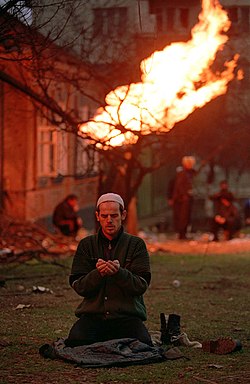
|
A Chechen man prays during the First Battle of Grozny, January 1995. The flame in the background is coming from a gas pipeline which was hit by shrapnel. This battle was the Russian army's invasion and subsequent conquest of the Chechen capital, Grozny, during the early months of the First Chechen War. The attack lasted from December 1994 to March 1995, resulted in the military occupation of the city by the Russian Army and rallied most of the Chechen nation around the separatist government of Dzhokhar Dudayev. Photo credit: Mikhail Evstafiev
Recently featured:
|
March 23
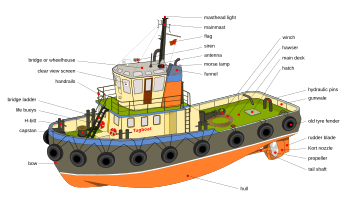
|
A diagram showing the parts of a tugboat, a boat used to maneuver large ships in harbours, over the open sea, or through rivers and canals. They also tow barges, disabled ships, and oil rigs. Equipped with powerful engines producing thousands of horsepower, extensive rigging equipment, and a fender of tires for protection, tugboats can push or tow large vessels with high precision and speed. Image credit: Al2/Lycaon/Jeff Dahl
Recently featured:
|
March 24

|
The Emperor Tamarin (Saguinus imperator) is a tamarin native to the Amazon Basin and neighboring parts of South America. It was allegedly named for its similarity to William II, the last German Emperor. The name was first intended as a joke, but has become the official scientific name. Photo credit: Mila Zinkova
Recently featured:
|
March 25

|
Baseball pitcher Chris Young of the San Diego Padres practices his four-seam fastball before the June 16, 2007 game against the Chicago Cubs at Wrigley Field. During the game, Young hit Derrek Lee with a pitch, which led to a bench-clearing brawl. Both players were ejected from the game, which ended in a 1–0 victory for San Diego. The game took place a few weeks before Young was added to his first Major League Baseball All-Star Game roster via the All-Star Final Vote. The picture also depicts a Wrigley Field bullpen located in playable foul territory. In the background, the old-fashioned scoreboard and the 2005–06 reconstruction of the centerfield bleachers are visible. March 25 is Opening Day for Major League Baseball. Photo credit: Antonio Vernon
Recently featured:
|
March 26

|
The School of Athens or "Scuola di Atene" in Italian is one of the most famous paintings by the Italian Renaissance artist Raphael. It was painted between 1509 and 1510 as a part of Raphael's commission to decorate with frescoes the rooms that are now known as the Stanze di Raffaello, in the Apostolic Palace in the Vatican. Artist: Raphael
Recently featured:
|
March 27

|
|
Panorama of the Court of Honor of the Louvre, one of the most visited and famous art museums in the world. In the center is I. M. Pei's glass pyramid that serves as the main entrance to the museum. Among its collection of 380,000 objects (including 11,900 paintings) are the Mona Lisa, Venus de Milo, and Winged Victory of Samothrace. Photo credit: Benh Lieu Song
Recently featured:
|
March 28

|
The Olympic Stadium in Montreal, Quebec, Canada, at night. The stadium was originally built for the 1976 Summer Olympics and its inclined tower, called la tour de Montréal, is the tallest inclined tower in the world at 175 m (574 ft) and is a member of the World Federation of Great Towers. Photo credit: Acarpentier
Recently featured:
|
March 29

|
The Cessna 182 (182P model shown here) is a four-seat, single-engine, light airplane. Introduced in 1956, it is the second most popular Cessna model, after the 172. Photo credit: Fir0002
Recently featured:
|
March 30

|
The Manhattan Bridge, under construction in 1909, nine months before its opening on December 31, 1909. This suspension bridge crosses the East River, connecting Lower Manhattan with Brooklyn, just upriver of the Brooklyn Bridge. All of the buildings in foreground of this photograph, with the exception of the Empire Warehouse on the left, are no longer standing. Photo credit: Irving Underhill
Recently featured:
|
March 31
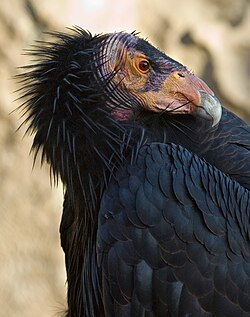
|
The California Condor (Gymnogyps californianus) is a critically endangered species of North American bird in the New World vulture family Cathartidae. It has the largest wingspan of any bird found in North America and is one of the heaviest. The condor is a scavenger and eats large amounts of carrion. The California Condor is one of the world's rarest bird species. In 1987, all 22 remaining wild individuals were captured. Thanks to captive breeding, numbers rose, and beginning in 1991, they were reintroduced to the wild. As of March 2008, there are 297 condors known to be living including 146 in the wild. Photo credit: Chuck Szmurlo
Recently featured:
|
Picture of the day archives and future dates